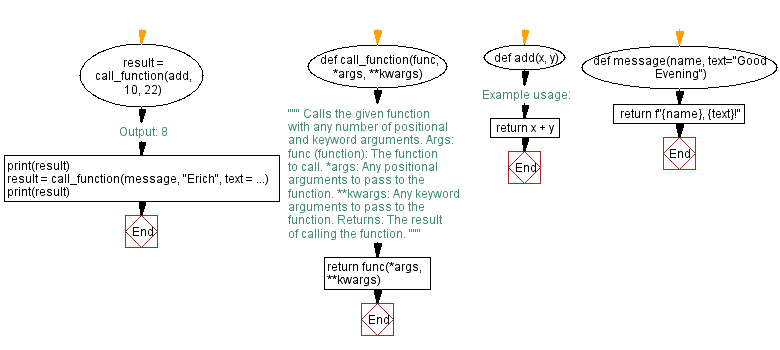Python Function: Calling functions with flexible arguments
2. Function as Argument Caller
Write a Python function that takes a function as an argument and calls it with any number of arguments.
Sample Solution:
Code:
def call_function(func, *args, **kwargs):
"""
Calls the given function with any number of positional and keyword arguments.
Args:
func (function): The function to call.
*args: Any positional arguments to pass to the function.
**kwargs: Any keyword arguments to pass to the function.
Returns:
The result of calling the function.
"""
return func(*args, **kwargs)
# Example usage:
def add(x, y):
return x + y
result = call_function(add, 10, 22)
print(result) # Output: 8
def message(name, text="Good Evening"):
return f"{name}, {text}!"
result = call_function(message, "Erich", text = ...)
print(result)
Output:
32 Erich, Ellipsis!
In the exercise above, the "call_function()" function takes a 'func' argument, which is the function to call, and uses *args and **kwargs to accept any number of positional and keyword arguments. It then calls 'func' with these arguments and returns the result. As a result, you can call different functions with different numbers of arguments by using the same "call_function ()".
In this code, the ellipsis (...) is used as a placeholder for unspecified arguments in the function calls 'add' and 'message'. It indicates that there can be additional positional or keyword arguments.
Flowchart:

For more Practice: Solve these Related Problems:
- Write a Python function that accepts another function and a list of arguments, calls the function with these arguments, and prints the returned result.
- Write a Python program that takes a function and a variable number of positional arguments, applies the function to each argument, and returns a list of results.
- Write a Python script to define a higher-order function that takes a function as an argument, then calls that function with both positional and keyword arguments.
- Write a Python function that receives another function and a tuple of arguments, then uses argument unpacking to call the function and prints its output.
Go to:
Previous: Python Function: Printing arguments with *args.
Next: Python Function: Slicing the third dimension of a multidimensional array.
Python Code Editor :
What is the difficulty level of this exercise?
Test your Programming skills with w3resource's quiz.
